I thought coming up with my favorite reads of 2018 would be difficult. For the past five months or so I’ve had a hard time concentrating on reading, and it felt like I read few books that were especially noteworthy or good this year. Going through my Goodreads list to write this post, I realized that all my favorite books were front-loaded into the first half of the year. Not sure why that is, but there you have it.
As usual, this list is in chronological order of when I read them.
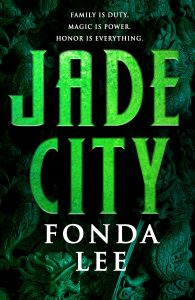 Jade City by Fonda Lee
Jade City by Fonda Lee
This was the first fiction book I read in 2018, and hoboy, it set a high standard for all books I read following it for the rest of the year. Fantastic secondary East Asian, post-WWII-esque universe with magic, martial arts, and complex, fucked up personal, familial, clan, national, and international politics, sharp, tense, fast-paced, evocative writing, and the kind of oh-so-all-encompassing character-centric fiction I love to sink into and love myself and entire senses in make this book so fucking good. Fonda Lee is a fantastic author – I’ve read all her books so far and this is the best one yet. I cannot wait for Jade War to come out next year.
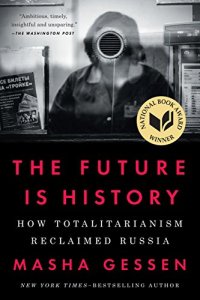 The Future Is History: How Totalitarianism Reclaimed Russia by Masha Gessen
The Future Is History: How Totalitarianism Reclaimed Russia by Masha Gessen
I first started reading Masha Gessen’s work following the 2016 election with the article “Autocracy: Rules for Survival” and have been reading every article that’s come out since then. The Future Is History is a compelling, informative, and morbidly fascinating narrative history and sociological/psychological examination both of Russia’s transition from the communist, authoritarian Soviet Union to the capitalist, quasi-democratic Russia to the effectively authoritarian Putin-led country of today and how peoples’ sense of itself, its past, and its future have changed over the past thirty years as a result of the transitions.
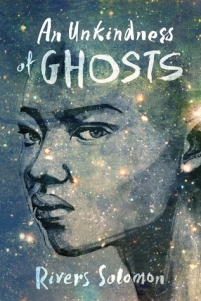 An Unkindness of Ghosts by Rivers Solomon
An Unkindness of Ghosts by Rivers Solomon
The story of a generation ship with a hierarchy rooted in the social and racial mores of Antebellum slavery with those of the lower decks serving and at the mercy of the upper-deckers, the book follows Astrid, an autistic, nonbinary lower-decker searching for answers about her mother’s death and the hidden truth of the generation ship she died trying to uncover. Rivers Solomon’s writing is a work of art in the way it melds beauty and brutality and softness and harshness, as is their worldbuilding of a generation ship with all its interlocking, overlapping social structures, languages, routines, and secrets. More than anything, it’s this book’s honesty that really makes it so great.
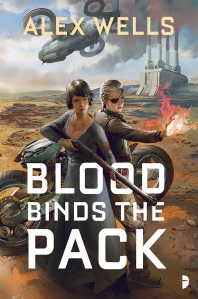 Blood Binds the Pack by Alex Wells
Blood Binds the Pack by Alex Wells
The sequel to Hunger Makes the Wolf, which came out last year and I loved. This book picks up right where the other left off, and is full of outlaw motorcycle gang goodness, union organizing and striking, corporate shenanigans, planetary magic-science weirdness, and, most importantly, Hob fucking Ravani. She’s one of my new all-time favorite protagonists, and I’m fucking bummed there aren’t any future books planned in this series. (Fix this, Angry Robot!)
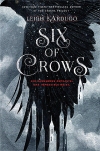
 Six of Crows/Crooked Kingdom by Leigh Bardugo
Six of Crows/Crooked Kingdom by Leigh Bardugo
I’d read the Grisha trilogy a couple years ago and thought it was alright but not great; my housemate and others had read and loved Six of Crows, and that plus the fact I love heist stories made me read this series. I’m so fucking glad I did – I love ensemble casts, especially of the found/forged family variety, and the Six of Crowscrew and each characters’ relationships with each other are a dream. Kaz Brekker’s amorality is so good I honestly have to pinch myself that he actually exists in a YA novel, Inej is just fantastic, and I love Jesper and Wylan individually and together. (Nina and Matthias are fine, the others are just more my favorites.) I love the cleverness and complexity of the cons, the setting of Ketterdam, and all the details that go into making the crew’s exploits, talents, and weaknesses come to life. It’s just a great series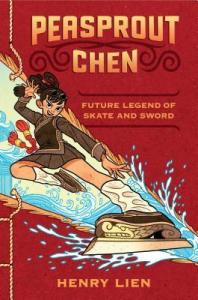
Peasprout Chen, Future Legend of Skate and Sword by Henry Lien
Figure skating meets kung fu! Peasprout Chen, a champion of wu liu, the art of martial arts figure skating, is the first student from the country of Shin, along with her younger Cricket to be admitted to the Pearl Famous Academy of Skate and Sword. A strong skater and proud of her abilities, Peasprout finds herself alone with few friends or allies at the academy, locked in a bitter rivalry with a classmate who’s her equal at wu liu, and caught in the crossfires of the disintegration of Shin and Pearl’s uneasy relationship. This middle grade novel was an absolute delight – I loved the ingenious and inventiveness of everything about wu liu, as well as the fact that this is a book of proud girls being proud all the time, and it’s a flaw but not a “the narrative is punishing them because girls being proud is terrible” kind of flaw. I’m not sure if there are any planned sequels, but if there are, I look forward to reading them.
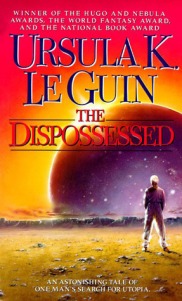 The Dispossessed by Ursula K. Le Guin
The Dispossessed by Ursula K. Le Guin
I’ll be honest, before this year I’d only read The Left Hand of Darkness (which I remember thinking was OK but not mind-blowing or life-changing, though I do want to reread it now that I’m older (dear god I was eighteen nine years ago *cries*))) and had attempted to read A Wizard of Earthsea in high school but stopped a couple chapters in because I was bored. (I’m sensing a theme in not being able to get into Le Guin until I was an adult, which I feel is…the opposite of most peoples’ experiences.) Thanks go to my housemate for continuing to ramble about how much they loved The Dispossessed to the point that I was finally convinced to read it, and dear god I was not disappointed. It’s so wonderfully chewy and such delicious brain food. I was even into the physics musings, and I’m never interested in physics, fictional or otherwise! And I loved how the concepts and explorations of anarchy dovetailed so neatly with Shevek’s physics research, and how thoroughly Le Guin was able to see and identify on the page all the nuts and bolts that make our capitalist, pseudo-democratic society work and what different kinds of nuts and bolts an anarchic society might need. I also love that at the end of the day, it’s not a question of anarchy versus other forms of government, but one of embracing flexibility and change versus defensive and fearful reactionism against it.
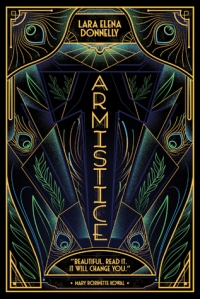 Armistice by Lara Elena Donnelly
Armistice by Lara Elena Donnelly
This series is so much fun, which I feel slightly bad about saying since it’s set in a secondary world set in the equivalent of 1930 fascistic Europe, but it’s true. In addition to more of Aristides being a disaster human and Cordelia being the amazing espionage planner that she is, Lillian DePaul, Cyril’s brother, is introduced and brings her ice-cold demeanor and canniness into the mix. Together, the three of them fight and snarl their way into undermining the Ospies not just in Gedda, but in Porachis, the South Asian analogue where most of Armistice is set. Please and yes.
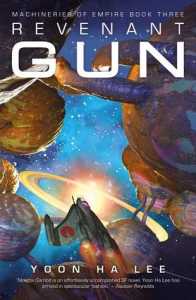
Revenant Gun by Yoon Ha Lee
The end of the Machineries of Empire trilogy. While I didn’t love this book as much as its predecessors – I wasn’t that into teenage!Jedao being created to lead the remainder of the Hexarchate (though I loved the Big Reveal concerning the actual resurrection aspect) and Kujen has never been of particular interest to me, so I was never going to be that into the reveals of Kujen’s origins. However, I *loved* that we finally got some chapters from the servitors’ perspective and more of a window into their politics, I loved spending more time with Cheris/Jedao and Mikodez, and I just generally loved spending more time in this world with these characters. While Revenant Gun isn’t my favorite, my love of the series as a whole and the strength of the series’ conclusion meant this book was always going to end up in this year’s round-up of favorite books.
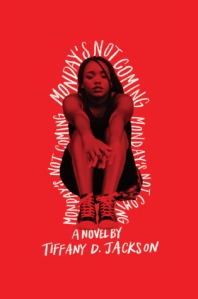 Monday’s Not Coming by Tiffany D. Jackson
Monday’s Not Coming by Tiffany D. Jackson
This book fucking destroyed me. My emotions were shot for the rest of the day and a lot of the next after finishing this. Claudia is excited to start eighth grade alongside her best friend Monday, but on the first day of school, Monday never shows up. She’s not there the next day either. Or the next. Or the next. Or the next. Claudia’s parents refuse to answer her questions or believe Monday is missing, nor do any other adults. No one seems to care about a missing Black girl from Southeast D.C, just one more of many. The more questions Claudia asks, the closer she gets to a terrible answer, about Monday and herself. Like Allegedly, this a thriller told by an unreliable narrator, except with Monday’s Not Coming, the unreliable narrator aspect really and truly works. Everything is horrifying and nothing is okay.
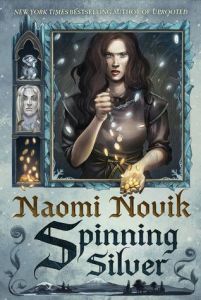 Spinning Silver by Naomi Novik
Spinning Silver by Naomi Novik
Spinning Silveris the Ashkenazi Jewish fairytale I never knew I needed but so badly did. I have never read a story before where a Jewish character assesses the anti-Semitic accusations leveled at herself and her family and deliberately embraces them as a form of strength. They think Miryem monstrous for daring to be the moneylender her father couldn’t be and collect on debts owed? She will be their monster if it means her family has enough to eat that winter for the first time in years. Don’t go into debt if you can’t pay the price, a maxim she shares in common with the fae Staryk. Miryem’s acumen as a businesswoman, her ability to turn silver into gold, attracts the notice of the Staryk king, who demands she use her talents in service to him and his kingdom. This Rumpelstiltskin retelling has such a historic Jewish sensibility, particularly in the way Meryem characterizes her role in the fight between the supernatural and mortal worlds. I love this book so much.
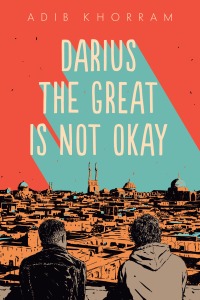 Darius the Great is Not Okay by Adib Khorram
Darius the Great is Not Okay by Adib Khorram
Shy, nerdy, clinically depressed, and kinda chubby, Darius has never felt like he fits in, what with kids bullying him at school and feeling like his own father thinks him a disappointment. While he and his family are visiting his mother’s parents in Iran, Darius meets Sohrab, a neighbor of his grandparents who seems to actually like Darius and hanging out with him and wants to be his friend. The more he and Sohrab hang out, the more he likes the person he is around Sohrab, and the more comfortable he grows in his own skin. This story was down-to-earth but also touching in its openness and honesty. Darius is such a relatable kid, from his nerdy analogies that feel like they’re coming from a real place and aren’t thrown for no reason except to signal nerdiness to his awkwardness with social situations, his body, and how to connect with the people in his life that he loves. At the end of the day, this book is about people trying to find the right language to express feelings, towards other people and themselves, and I *love* the closeness of Darius and Sohrab’s relationship. It’s not explicitly romantic or sexual, and it’s not “about” sexual orientation, necessarily (though there’s hints Darius could realize or decide he’s into guys) – rather, it’s two boys being emotionally intimate and vulnerable in ways they can’t be around other people, written in a way I haven’t seen in YA before.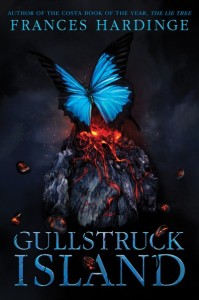
Gullstruck Island by Frances Hardinge
When was the last year I did a favorite books of the year roundup that didn’t include a Frances Hardinge novel on it? Hathin’s sister Arilou is a Lost – that is, someone who can experience the world outside of her body through all five of her senses. As a Lost, Arilou has a place of pride among her people, the Lace, a tribe who for centuries have been outcasts following the colonization of the island by the Cavelcaste, even among other tribes. However, Arilou may not actually be a Lost, and it’s the job of invisible, unremarkable Hathin to ensure no one outside her village suspects. But when all the Lost are murdered – except for Arilou – Hathin must now uncover a hidden conspiracy covering the entire island that’s being overseen and carried out by people as invisible as she is. Like many Frances Hardinge novels, Gullstruck Island has at its center a young protagonist who occupies the periphery of the world she lives in, only to take action that causes her to be the lynchpin with the power to burn the entirety of that world down and build it anew – in this case quite literally. Like her other novels, this one has fantastic world-building, beautiful and clever writing, wry and astute observations, NO ROMANCE, and great characters. Frances Hardinge is so consistently good – I keep singing the same praises every year, because almost every book I’ve read of hers has been so good, every year. (Gullstruck Island is the last of her older books I’ve read; there had better be a new one out next year!)
Honorable Mentions
- The Color of Law: A Forgotten History of how Our Government Segregated America by Richard Rothstein
- This Mortal Coil by Emily Suvada
- Simon vs. the Homo Sapiens Agenda by Becky Albertalli
- Tenements, Towers, and Trash: An Unconventional Illustrated History of New York City by Julia Wertz
- So You Want to Talk About Race by Ijeoma Oluo
- A Wizard of Earthsea by Ursula K. Le Guin
- Anger is a Gift by Mark Oshiro
- Cross Fire by Fonda Lee
- Aristotle and Dante Discover the Secrets of the Universe by Benjamin Alire Sáenz
- So Lucky by Nicola Griffith
- You’ll Miss Me When I’m Gone by Rachel Lynn Solomon
- Trail of Lightning by Rebecca Roanhorse
- Far From You by Tess Sharpe
- Annex by Rich Larson
- Record of a Spaceborn Few by Becky Chambers
- Forest of a Thousand Lanterns by Julie C. Dao
- The Black God’s Drums by P. Djèlí Clark
- Heavy: An American Memoir by Kiese Laymon
As far as statistics, I fell short of having 50 percent of the books I read be written by PoC authors, the reason being that when I entered my reading funk I started paying less attention to my goal. This year I read 73 books (includes fiction novels, novellas, and nonfiction). Of that total, 30 were written by PoC authors (43 percent, which is the same percentage I had in 2016). Of those 30 books, fifteen were written by Black authors (50 percent), ten by Asian/Asian American authors (30 percent), three by Latinx authors (10 percent), and one each by Native American and Middle Eastern authors (seven percent total). For 2019 my goal is to once again aim for a 50-50 parity between PoC authors and white authors.
I read a grant total of seven nonfiction books this year, which is one more than last year. I still can’t convince myself to read nonfiction during my free time when my brain is clamoring at me about my endless list of fiction books I keep putting off reading. I’m going to keep trying to read more nonfiction in 2019, but this time I’m not making any kind of goal or promise.
Other than that, I’m *very* cautiously hoping that 2019 will be the year I finally embark on my reread of the entirety of Robin Hobb’s books (minus the Soldier Son trilogy) so that I can finally read her latest trilogy featuring Fitz and the Fool. We’ll see if it ends up happening. I’m bad at rereading for the same reason I’m bad at reading nonfiction – I keep feeling like I should be reading fiction I haven’t read before!
I think that about does it. Happy new year and 2019 everyone!
